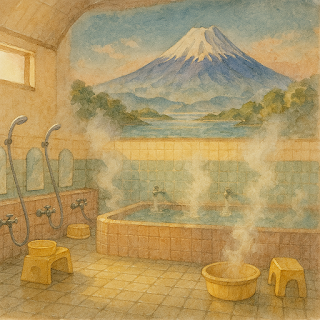Public Bath Culture - Sento
🛁 Public Bath Culture - Sento
🏞 Scene Description
At a local public bathhouse (sento), a salaryman returning from work, a parent and child, and an elderly couple each soak in the large bath, washing away the fatigue of the day.

💬 Natural Conversations and Expressions
🥿 At the Entrance and Changing Room
・「靴はここに入れてね」(Kutsu wa koko ni irete ne) - “Put your shoes in here”
・「券を買ってから入るんだよ」(Ken wo katte kara hairunda yo) - “You have to buy a ticket first”
🚿 At the Washing Area
・「まず体を洗ってからね」(Mazu karada wo aratte kara ne) - “Wash your body first”
・「背中流しましょうか?」(Senaka nagashimashou ka?) - “Shall I wash your back?”
・「熱いけど気持ちいい〜」(Atsui kedo kimochi ii~) - “Hot, but it feels so good”
♨️ In the Bathtub (Inner Thoughts and Conversation)
・「ふぅ〜、極楽極楽」(Fuu~, gokuraku gokuraku) - “Ahh… paradise”
・「今日も一日お疲れさま」(Kyou mo ichinichi otsukaresama) - “Good job today”
🌸 Cultural Points and Expression Background
「体を洗ってから入る」 - Respect for Shared Cleanliness
Washing before soaking reflects the cultural importance of shared responsibility and cleanliness in communal spaces. This is a basic but essential form of Japanese manners.
「背中流しましょうか?」 - Helping One Another in Communal Baths
Even among strangers, helping each other is natural. Sharing a bath breaks down social walls and brings emotional closeness — a concept unique to Japan.
「極楽極楽」 - Bathing as Healing
Bathing in Japan is more than just hygiene — it is a form of healing. The term "Gokuraku" (paradise) symbolizes complete relaxation. This practice has roots in long-standing traditions such as "toji" (therapeutic bathing) and visits to hot springs.
👪 Bathing with Family - Naked Bonds of Trust
Bathing together in the nude is not shameful but rather a natural expression of trust and bonding. Sento also serves as a community hub where such relationships are nurtured outside of the home.




Comments
Post a Comment